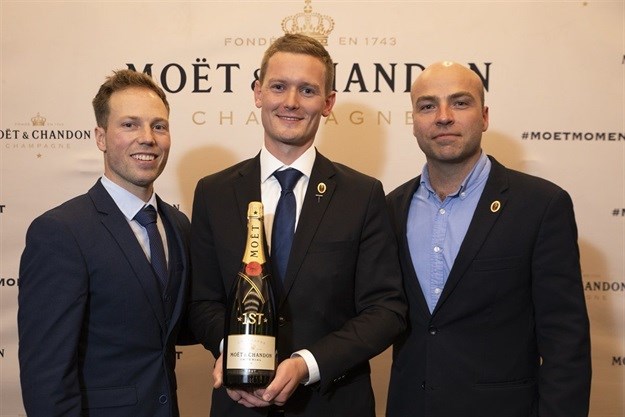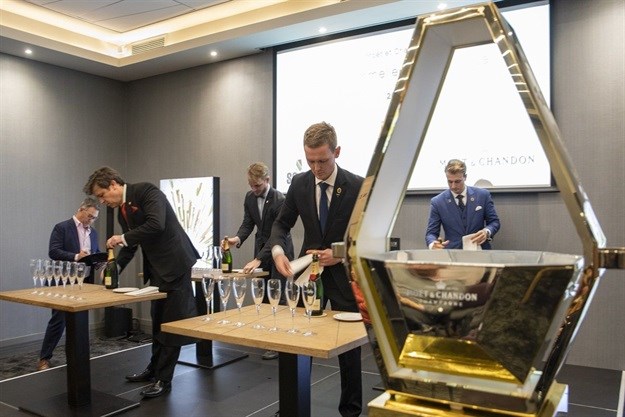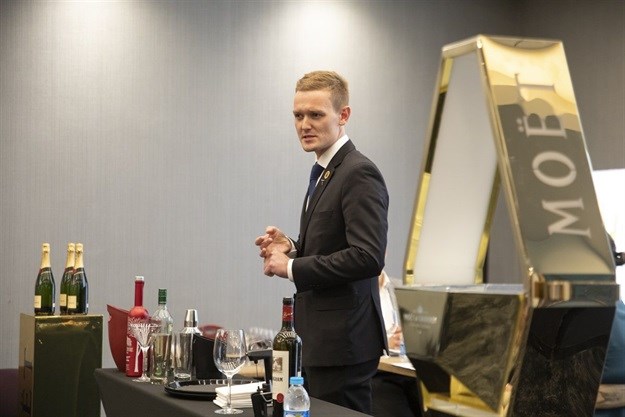
Top stories





Energy & MiningGlencore's Astron Energy gears up with new tanker amidst Sars dispute
Wendell Roelf 14 hours

More news

















Logistics & Transport
Uganda plans new rail link to Tanzania for mineral export boost










Wessels, currently based in Germany, is a BSc student completing a course in International Wine Business at HGU (Hochschule Geisenheim University). He is also enrolled at DWS (German Wine and Sommelier School) completing his WSET Diploma and works part-time as a Commis Sommelier at the Michelin-star ENTE Restaurant in Wiesbaden.
This award is the fourth award to be added to his list of accomplishments in 2018, after winning the Rolling Pin Awards' Sommelier of the Year 2018, being named the Best Young Sommelier in the Meininger Nachwuchssommelier 2018 awards and placing first in the DWI (German Wine Institute) Sommelier-Cup 2018.

The South African Sommelier Association (SASA) and Moët & Chandon, with this competition, aim to acknowledge and empower professional sommeliers who share the joy and energy of wine and spirits.
“There is no doubt in my mind that the sommelier profession is not only growing but also advancing in South Africa,” says Higgo Jacobs, founding member and president of the South African Sommeliers Association (SASA). “This is only the second time that we are staging our national contest with the support of Moët & Chandon after the first one in 2016, and already we have a pool of semi-finalists of great calibre with plenty of candidates that could have taken the title. Standards have been incredibly high this year.”
Wessels and runners-up Jean Vincent Ridon of France, Joakim Blackadder of Sweden endured three rounds of rigorous tests and were judged by an expert panel on their ability to taste and identify spirits as well as standard service tasks and theory. All three displayed excellent overall wine knowledge of South African and international wines in terms of region, viticulture and vinification, as well as knowledge of beers, ciders, spirits, water, coffee and tea.
Questions included topics such as wine styles, regions of origin and terminology, wine label information, wine regulations and wine storage. Competitors were also tested on social skills as well as their ability to interact with the patrons by judges including: Jacobs; Neil Grant, co-founder and owner of Burrata and Bocca restaurants, former president, SASA; William Wouters, vice president – Europe for the Association de la Sommellerie Internationale (International Association of Sommeliers); and Malika Van Reenen, executive chef, Cape Grace Hotel.
Wessels will represent South Africa at the ASI Best Sommelier of the World Championships in Belgium in 2019, including a trip to visit the Moët & Chandon Maison in France.

We caught up with Wessels, the man in the spotlight who has been named Moët Best Sommelier 2018.
Wessels: Blind tasting can be an amusing exercise, but it's also quite silly – in reality nobody drinks wine in this way! Nonetheless it is a useful tool for understanding the structure of a wine and especially determining its true quality without being influenced by a label. It requires a lot of wine sampling and practice, but essentially it is a skill that can be learned. It is, however, not a key factor for the enjoyment of wine. Tasting and discussing a wine is essential in this trade, but the most joy of course comes from simply drinking it!
Wessels: The world championship for the Association de la Sommelierie Internationale (ASI) will be taking place in Belgium next year. It is probably the toughest wine competition there is, drawing the best sommeliers from around the globe (many of the candidates are working towards their Master Sommelier title). So the next few months will require an extreme amount of dedication, discipline and training. I am honoured to be representing my country and hope to do us proud!
Wessels: The semi-finals involved a tricky theoretical paper and blind tasting, followed by a practical task in a restaurant setting where we had to serve an older red wine, some of which weren't in great condition with brittle corks adding to the challenge. The final included elements of cocktail preparation, wine service with a Coravin, food and wine pairing, blind tasting and Moët & Chandon Champagne service. Basically, the Moët Best Sommelier competition tested all the elements that a good sommelier should be well acquainted with.
Wessels: The most important change I have noticed is the continued improvement in quality – the wines are getting better and more interesting year after year. And South Africa is also particularly evolving in the sphere of gastronomy. Not only are our wines getting better, but also our culinary offering. It's a wonderful time to be South African.

Wessels: SASA is doing a great job of raising the profile of the sommelier trade in South Africa, with a strong focus on education of wine waiters and future sommeliers. I am truly happy that we have so many talented ambassadors in our restaurants, raising the quality of the wine offering and standard of service. I also believe there is a greater exchange between sommeliers and winemakers, and that this can also play a role in honing the quality of our wines even further.
Wessels: I hope to see a greater move towards organic viticulture and winemaking. I feel that our wine industry is lagging behind in this regard, in comparison with our international peers.
Wessels: Like many others, I don't have a natural background in wine. I was born and raised in Bloemfontein, so I grew up with mielies instead of grapes. It was my older sister who first entered the world of wine, studying viticulture and oenology at Stellenbosch and later becoming the winemaker at Vrede en Lust. I came to Stellenbosch to study a BA in Politics, Philosophy and Economics, but was interested and drawn to the work my sister was doing. Out of curiosity I did an introductory course through the Cape Wine Academy, landed a weekend job in a tasting room and that was the beginning of my venture into the world of wine. This world and its people fascinated and engulfed me and I knew I simply had to be part of it.
Wessels: I've actively pursued a career in the wine industry since 2007, first working for a few wine farms, then at The Vineyard Connection in Stellenbosch. My fine-dining experience started at Rust en Vrede Restaurant, under the watchful eyes of David Higgs, Neil Grant and later Joakim Blackadder. I gained some international experience working on the smaller luxury cruise ships of Oceania and Seabourn. I’ve been in Germany since 2015 for further wine studies and have been involved at ENTE Restaurant, which is a renowned Michelin-star restaurant in Wiesbaden. My predecessor there is Marc Almert, who currently holds the title of Best Sommelier in Germany. Incidentally he also won the WOSA Sommelier Cup in South Africa last year. He is the epitome of a great sommelier, especially one that selflessly supports peers in the trade. He advised and encouraged me to participate in wine competitions. Next year we will be competing against each other in Belgium, but it couldn't be friendlier!
Wessels: It's a combination of theoretical and practical knowledge, which entails a fair amount of learning. But it's not just facts – someone can know all there is about wine and still be terrible at serving it. A professional somm has to have a knack for hospitality and truly connect with guests – reading their wants and needs and offering advice without being pushy. I'm not a fan of "rockstar" sommeliers who enjoy taking centre stage. In my opinion, a restaurant should revolve around its guests.